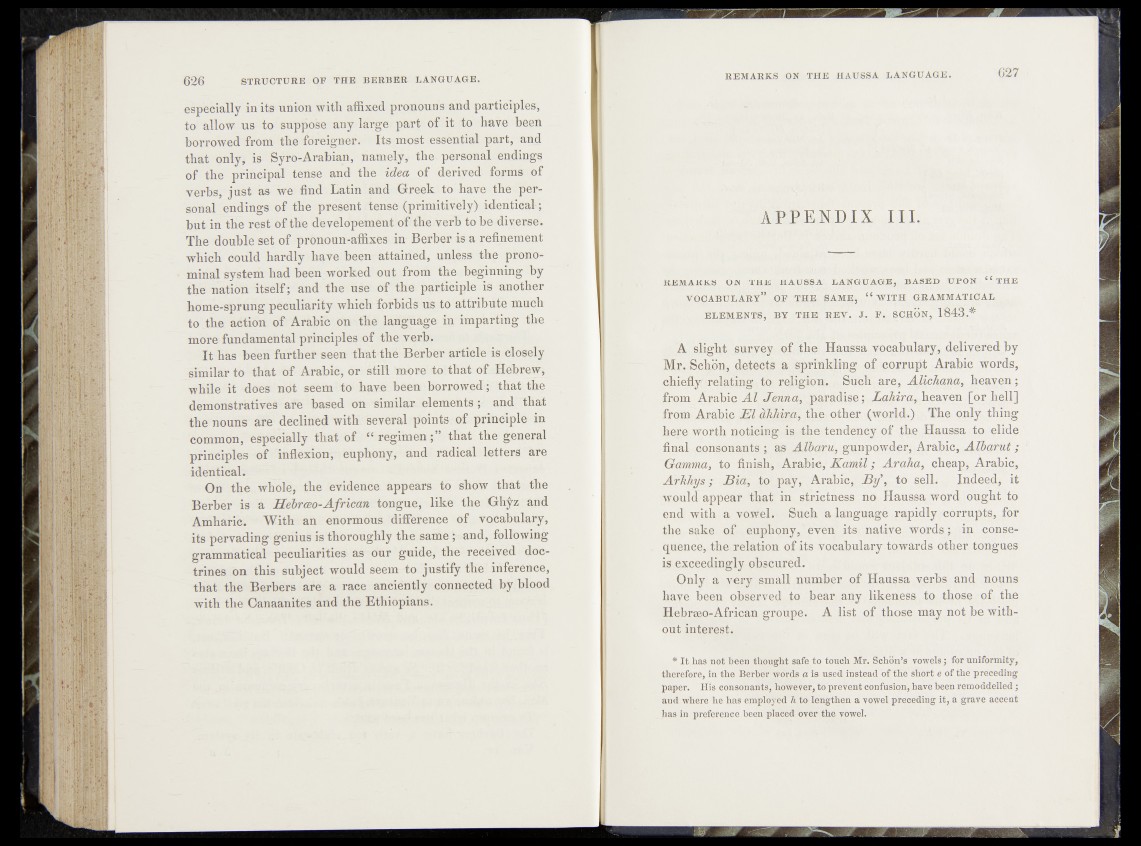
especially in its union with affixed pronouns and participles,
to allow us to suppose any large part of sit' to have been
borrowed from the foreigner. Its most essential part, and
that only, is Syro-Arabian, namely, the personal endings
of the principal tense and the idea of derived forms of
verbs, just as we find Latin and Greek to have the personal
endings of the present tense (primitively) identical-;
but in the rest of the developement of the verb to be diverse.
The double set of pronoun-affixes; in Berber is a refinement
which could hardly have been attained, unless the pronominal
system had been worked out from the beginning by
the nation itself; and the use of the participle is another
home-sprung peculiarity which forbids us to attribute much
to the action of Arabic on the language ih imparting the
more fundamental principles of the verb,
It has been further seen that the Berber article is closely
similar to that of Arabic, or still ’more to that of Hebrew,
while it does not seem to have been borrowed'; that the
demonstratives are based on similar elements; and that
the nouns are declined with several points of principle in
common, especially that of “ regimen;” that the general
principles of inflexion, euphony, and radical letters are
identical.
On the whole, the evidence appears to show that the
Berber is a Hebrceo-African tongue, like the Glfyz and
Amharic. With an enormous difference of vocabulary,
its pervading genius is thoroughly the same ;*>and, following
grammatical peculiarities as our guide, the received doctrines
on this subject would seem to justify the inference,
that the Berbers are a race anciently connected by .'blood
with the Ganaanites and the Ethiopians.
A P P E N D I X I I I .
REMARKS ON THE HAUSSA- LANGUAGE, BASED UPON “ THE
VOCABULARY” jCfF THE SAME, WITH GRAMMATICAL
ELEMENTS, BY THE REV. ^ F. SCHO-N^ 1843.*
A slight survey of th,e Haussa vocabulary, delivered by
Mr. Schön, detects a sprinkl|pg of corrup’t Arabic words,
chiefly/'relating to religion. Such are, Afic^^ar heaven;
fyom Arabie A l Jenna, paradise ;. Lahira, heaven [or hell]
from Arabic E l akhira, the« other (worldly. The only thing
here worth noticing is the tendency of the Haussa to elide
final consonants ; as AIbaru, gunpowder, Arabic, Alhartd ;
Gamma, to finish, Arabic,- Kamil ; Araha, cheap, Arabic,
Arhhys ; Biit3 to ’pay, Arabic,-; . ^ ’, to sell. Indeed, it
woulff appear that in strictness no Haussa word ought to
end with a vowel. Such a language. rapidly ^corrupts, for
the sake of euphony,'even its;.native words ; in consequence,
the..relation of its vocabulary towards other tongues
is exceedingly obscured.
Only a very small number of Haussa verbs and nouns
have been observed to bear any likeness, to those of. the
Hebræo-African groupe. A list of thos^ may not be without
interest.
* It.has not been thought safe to touch Mr. SchSp’s vowels ; for uniformity,
therefore, in the Berber words a is used instead of tKeshbrt e of the preceding
paper. His consonants, however, tb'prëvent confusion, have been renooddelled ;
and where he has employed h tp lehgthen a vowel preceding it, a grave accent
has in preference been placèd over the vowel.